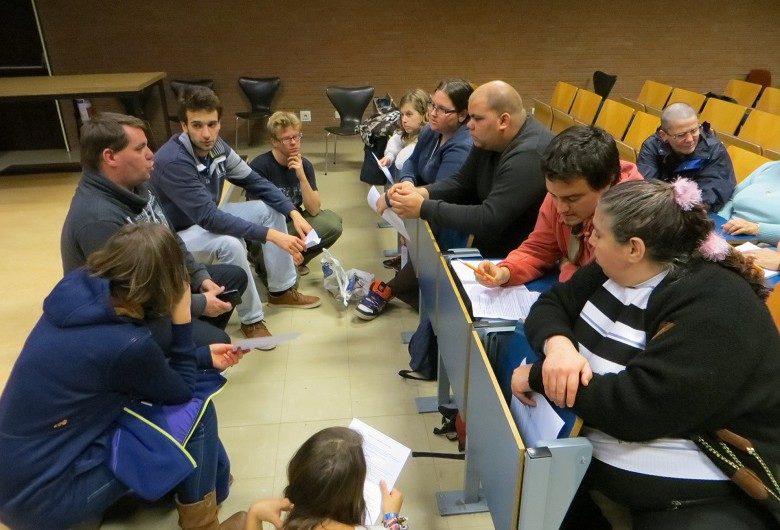Being a Parent Against All Odds

In Belgium for 2016, Fourth World People’s University sessions were focused on the theme: “Young and old together, forging ahead to give a future to all.” This article is about their work on questions of parenthood.
For the last two months, people living in poverty and others acting in solidarity with them have been thinking about what it means to be a parent based their own experiences. During the October session of the People’s University, they pointed out certain obstacles and also defined the kind of support that enables parents to fulfill this role completely. Obstacles cited were feeling isolated from others in the community, and struggling with the challenges of poverty. This situation can be worsened when they feel pushed aside by outsiders making decisions and taking action in their place. However, parents also spoke about positive ways that people outside their family can support them and offer the possibility of conversation. Many also appreciate the chance to learn from others, or to be welcomed in hospitality or support centers.
Some participants spoke about their experience with the Youth Support Service, which aims to support at-risk children and their families. The points of view were mixed. A few expressed having felt betrayed when a professional visited their home and then gave them a negative report. They also feel that the Youth Support Service often takes away the parental role, “hardly letting parents get a word in”. They resent a lack of communication. Others see this same service as a support for parenthood, where staff can give helpful advice. In the discussion, it became clear that some parents thought that the only role of the Youth Support Service was to remove children from parental care and did not know that it also offers support meant to avoid this step.
A young participant spoke about seeing parents whose children have been removed on charges of “neglect” and sent to foster care during schooldays. She said, “You should see the suffering of the parents…what they go through. When they don’t see their children from Monday to Friday, they see them only on weekends and then the children leave again, the parents try to hide it but they are not in good health or in good spirits. You don’t feel like a parent in the midst of all of this.”
Another participant explains, “When we were put in foster care as children, sometimes we got so disconnected from our families that we don’t even know who we are anymore. And because we don’t know who we are, we don’t know anything to pass to our children and grandchildren.” Extreme poverty is one of the reasons for foster care placement. When poverty is generational, foster care often recurs as well. Poverty breaks family ties and can separate children from their parents, sometimes from their birth. Allowed to see each other only once a month in some cases, some parents and children hardly know each other. Knowing nothing meaningful about each other, they can become strangers. When family bonds are broken, especially for a long time, a wound opens that may never heal, both for children and parents.
Nevertheless, building a family, raising children, and deciding how they should be educated to give them are all rights recognized by the Universal Declaration of Human Rights. So when foster care becomes necessary, what can be done to protect family bonds?
To learn more about the People’s University, or to join in, please contact:
This article is translated from ATD Fourth World–Belgium’s newsletter, “Partenaires,” n°95.

